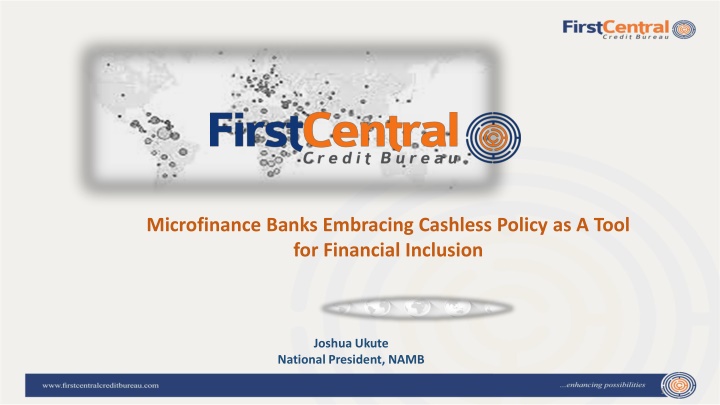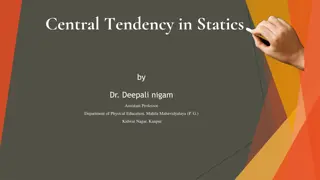
Impact of Cashless Policies on Financial Inclusion
Explore the implications of cashless policies, financial inclusion data in Nigeria, and the future of Microfinance Banks in embracing digital financial services to promote accessibility and affordability for individuals and businesses.
Download Presentation

Please find below an Image/Link to download the presentation.
The content on the website is provided AS IS for your information and personal use only. It may not be sold, licensed, or shared on other websites without obtaining consent from the author. If you encounter any issues during the download, it is possible that the publisher has removed the file from their server.
You are allowed to download the files provided on this website for personal or commercial use, subject to the condition that they are used lawfully. All files are the property of their respective owners.
The content on the website is provided AS IS for your information and personal use only. It may not be sold, licensed, or shared on other websites without obtaining consent from the author.
E N D
Presentation Transcript
https://encrypted-tbn0.gstatic.com/images?q=tbn:ANd9GcT-s3qs3xKs2g2aLhxUCAJM8E4wCOzxzMnEVz76HUbiF3LGKOTGhttps://encrypted-tbn0.gstatic.com/images?q=tbn:ANd9GcT-s3qs3xKs2g2aLhxUCAJM8E4wCOzxzMnEVz76HUbiF3LGKOTG Microfinance Banks Embracing Cashless Policy as A Tool for Financial Inclusion Joshua Ukute National President, NAMB 1
The CBN Cashless Policy 1. Max weekly withdrawals 500k Individuals, N5m Corporate 2. Third Party OTC withdrawals of 100k Max 3. Cash withdrawal charges of 3% for individuals and 5% for Corporate withdrawals above these limits 4. Stringent approval process and requirements for withdrawals above the weekly limits 5. Special recognition of Bank Agents and Mobile Money Agents in enabling access to financial services in under- served and rural areas The Central Bank of Nigeria via its letter dated 21st December 2022 issued a Naira Re-designed Policy and Cash Withdrawal Limits as follows: The Apex Bank explained that the cashless policy is aimed at scaling up financial inclusion and reducing cases of armed robbery, kidnapping, terrorism financing, advance fee fraud, graft, ransom payment, extortion and other crimes. Implications of the Cashless Policy: 1) Less Cash transactions 2) Alternative channels usage 3) Financial literacy 4) Partnerships 5) Investments in DFS 6) New Risks (Cyber Risks etc)
Financial Inclusion According to the World Bank, Financial Inclusion describes the situation where Individuals and Businesses have access to useful and affordable financial products and services that meet their needs. These include Transactions, Payments, Savings, Credit & Insurance delivered in a responsible and sustainable way. Enhancing Financial Innovation and Access (EFInA) defines Financial Inclusion as the provision of a broad range of high quality financial products, such as savings, credit, insurance, payments and pensions, which are relevant, appropriate and affordable for the entire adult population, especially the low income segment Financial Inclusion can be summarized into Broad range financial products Relevance & Appropriateness of Financial Products Affordability Responsible and Sustainable Delivery i. ii. iii. iv.
Financial Inclusion Data In Nigeria The 2020 Access To Finance Report by EFInA 38m adults are financially excluded 81% (30.8m) live in the rural areas 19% (7.3m) live in urban areas 44% male, 56% female 106m 68m (64.1%) financially included 38m (35.9%) financially excluded 53.6m (50.5%) use formal financial services 14.4m (13.6%) use informal financial services 61% own phones 24% use phones owned by others 16% do not own phones Adult Population Opportunities 1. High Financially excluded population 2. Rural dominance (where about 60% of MFBs are located) 3. Mobile Phone Penetration - for DFS 4. Lack of Credit access 5. Savings opportunities 6. Alternative to Cash earnings . 25% Saving 75% Not Saving Financially Excluded Adults 81% Not Borrowing from FI 19% From Family & Friends
What is Next for MFBs? 1. Environmental Assessment: How does this cashless policy affect the individuals and businesses around us? What are the financial behaviour of the excluded around us? What gaps exist? 2. Embrace Digital Financial Services: Build capacities around DFS as laudable alternative. Get Partnerships that support DFS 3. Develop DFS Products: Review Existing Products and Channels of delivery. Develop products around the opportunities that will enhance inclusion. 4. Risk Management: Develop the right RM Framework for DFS Advantages of DFS 1. Efficient Payment System 2. Reduced cost 3. Increased Outreach 4. Increased Financial services and products 5. Easy accessibility






















